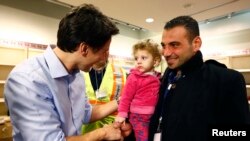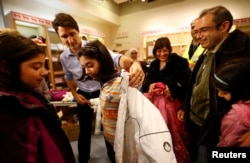United Nations and international agencies welcomed the arrival in Toronto, Canada, of a first group of Syrian refugees for settlement.
The 163 refugees, who traveled from Jordan, are the first of 25,000 Syrians to be resettled in Canada by early next year. They arrived late Thursday in Toronto.
Of the refugees who arrived, 116 will settle in the Toronto area. The others are sponsored by Canadians in another part of Ontario as well as British Columbia and Alberta. All 10 of Canada's provincial premiers support taking in refugees.
The Syrians are mainly from Aleppo and Damascus -- both Syrian cities have undergone heavy bombing and deprivation since the war began in 2011.
The refugees were greeted upon their arrival by Prime Minister Justin Trudeau, the ministers of immigration, health and defense, Ontario Premier Kathleen Wynne and Toronto Mayor John Tory.
Trudeau said that Canada is showing “the world how to open our hearts” and welcome people fleeing “extraordinarily difficult situations" in search of a better life.
“We define a Canadian not by a skin color or a language or a religion or a background,” Trudeau said, “but by a shared set of values, aspirations, hopes and dreams that not just Canadians but people around the world share."
Praised effort
U.N. refugee spokesman Adrian Edwards says his agency applauds the swift manner in which Canada is acting in implementing the humanitarian initiative announced late last month.
“Canada’s programs are an expression of support to Syrian refugees; but, importantly for us, they are demonstrations too of solidarity to countries in the region that are hosting more than 4 million Syrian refugees,” Edwards said.
In an attempt not to overwhelm the refugees, the Canadian government asked the general public not to come to the airport, but that did not stop some well-wishers.
Trudeau said "This is a wonderful night... we get to show the world how to open our hearts and welcome in people who are fleeing extraordinarily difficult situations."
He said "we define a Canadian not by a skin color or a language or a religion or a background, but by a shared set of values, aspirations, hopes and dreams that not just Canadians but people around the world share."
Canada is set to welcome 25,000 refugees by the end of February. About 800 of them are being screened by security and health officers each day in Lebanon and Jordan, before they are transported to Canada.
Edwards says to date, some 30 countries have pledged to resettle an estimated 160,000 Syrians.
US resettlement lags
Although the United States is the world’s largest country of resettlement, it so far has admitted only a fraction of the more than 4 million refugees. Fewer than 2,000 have been reported resettled there since 2012.
Canada's embrace of the refugees is also in contrast to the U.S., where a presidential candidate, several governors and ordinary citizens have been very vocal in their stance that the refugees should not be allowed into the country.
Edwards told VOA the refugees undergo an extensive vetting process by both the UNHCR and national authorities in the U.S. before they are accepted for resettlement.
He said refugees eligible for resettlement are among the most vulnerable, desperate cases, and many have serious health problems or are disabled. Others are victims of torture and many include women, children and the elderly in urgent need of help.





